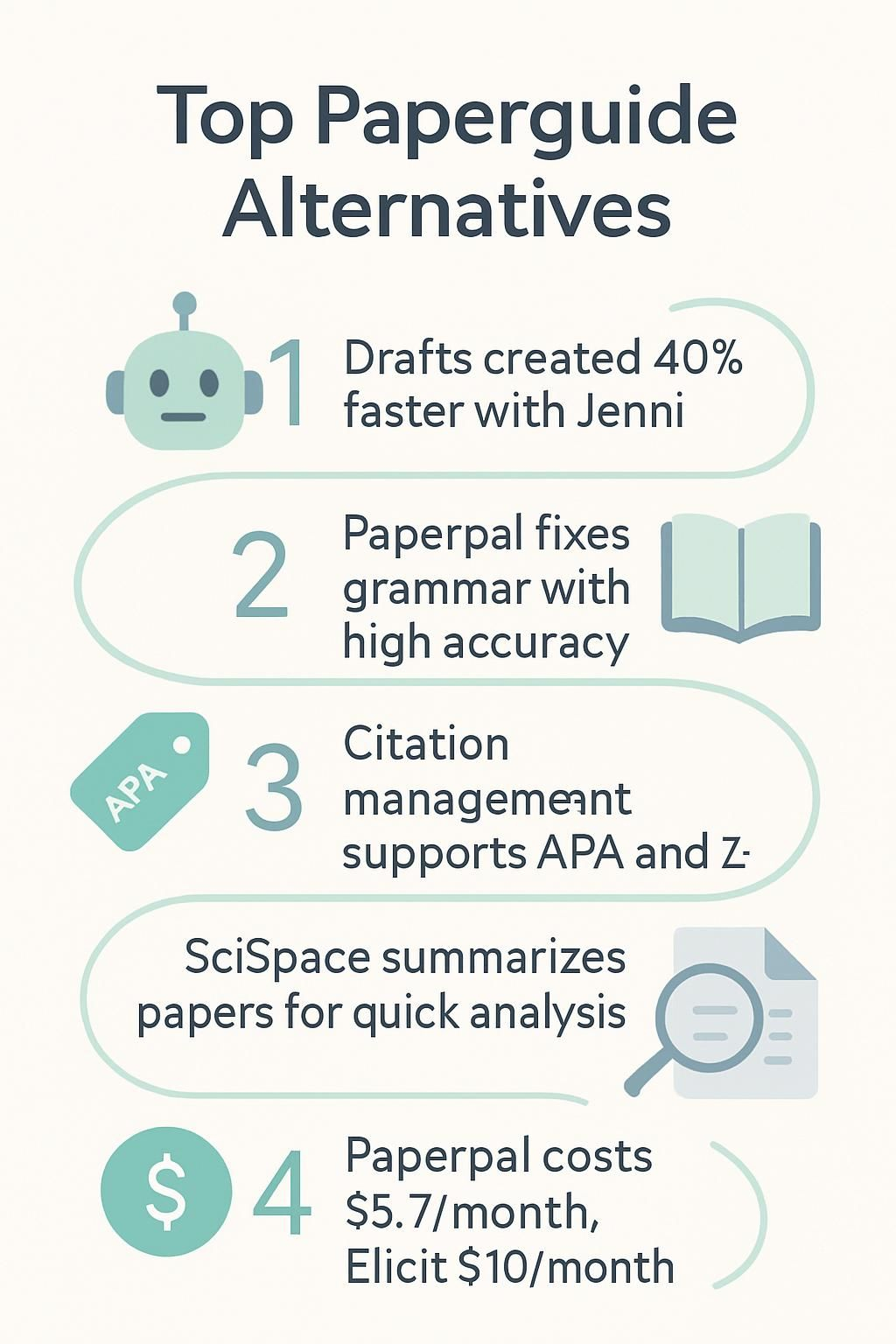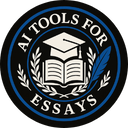Struggling to find the best tool for your academic writing or research papers? Paperguide is helpful, but it’s not always the perfect fit for everyone. This blog introduces top alternatives packed with features like AI research support, citation management, and more.
Keep reading to discover smarter tools!
Key Takeaways
- Many tools like Jenni, Paperpal, and Frase use AI to speed up writing and research. Jenni creates drafts 40% faster, while Paperpal fixes grammar with high accuracy.
- Citation management is easy with tools like Papers or Yomu. They support formats like APA and integrate smoothly with Zotero or Mendeley.
- Budget-friendly options include Paperpal at $5.7/month and Elicit’s Plus plan at $10/month. Advanced tools like Frase cost more but offer extra features.
- Tools such as SciSpace simplify PDF analysis by summarizing papers quickly, saving time for researchers.
- Some platforms improve productivity in unique ways: Afforai uses multi-model AI (ChatGPT-4), while Grammarly offers real-time grammar suggestions.

Key Features to Consider in Paperguide Alternatives
Finding the right tool means focusing on what works best for your writing and research needs. Think about features that save time, improve clarity, and handle citations with ease.
AI-driven research support
AI-driven research tools simplify academic workflows. Many alternatives use artificial intelligence for tasks like literature reviews, semantic searches, and summarizing research papers.
Tools such as Elicit process up to 1,200 documents in their Pro plan while offering AI-generated summaries. Afforai supports advanced models like ChatGPT-4 and Claude 3.5 to analyze PDFs or complex datasets.
Advanced search features make finding relevant studies easier. Consensus, for example, uses AI-powered search to deliver precise results from peer-reviewed sources. These platforms also sync with writing needs by recommending citations or improving clarity using NLP features.
Academic researchers can explore the next section on grammar and style enhancement to see how these tools refine writing further!
Grammar and style enhancement
Grammar tools polish writing by fixing errors and improving flow. Paperpal boosts clarity and tone with personalized feedback; its AI detects mistakes with 90-92% accuracy. Grammarly keeps false-positive rates under 5%, offering real-time suggestions for better style, grammar, and structure.
Both tools suggest context-based synonyms, helping writers avoid overused words.
Yomu supports multiple languages for spell checks, which is helpful for bilingual users or non-native speakers. CoWriter predicts words as you type while improving grammar in academic papers or casual essays.
These features make editing easier without sacrificing creativity or meaning, paving the way to explore citation management next!
Citation and reference management
Tools like Paperguide simplify citation and reference management, which is vital for academic work. They organize research sources and support various citation styles, including APA, MLA, or Chicago format.
Many alternatives integrate with Zotero, Google Scholar, or Mendeley to streamline the process further. For example, Papers allows PDF uploads while Yomu offers a quick citation generator.
Plagiarism detection features also enhance proper citations by ensuring authenticity. Tools like Paperpal combine grammar checks with references for seamless academic writing. This boosts efficiency while maintaining accuracy in literature reviews and research papers.
Using these tools can significantly lighten the load during critical projects!
Integration with other tools
Many research assistant tools connect easily with platforms like Zotero, Mendeley, and Google Scholar. These links help users manage citations and references more smoothly during writing tasks.
Grammarly and Paperpal offer browser extensions, speeding up edits without juggling between multiple apps.
Google Docs and Microsoft Word also support integrations for better academic writing workflows. For cloud-based tools like Yomu, stable internet is key for optimal function. Afforai takes things further by allowing multi-LLM support with ChatGPT-4 or Claude 3.5, fitting perfectly into AI-driven research needs.
Pricing and affordability
Cost plays a big role in choosing research tools. Jenni offers a free plan with 200 words daily or an Unlimited option at $12 per month. Paperpal is budget-friendly, starting at just $5.7 monthly for its Prime version.
For those needing advanced features, Frase charges $45 per month for its Starter plan while SciSpace’s Premium costs $12 monthly. Elicit’s Plus plan is cheaper at $10 per month but limits paper summaries to 4 simultaneously.
Choose based on your needs and budget to improve productivity without breaking the bank!
Jenni (⭐️ 4. 8)
Jenni makes writing simpler with its AI writing assistance. Its tools help tackle writer’s block and sharpen academic research.
Features & Benefits of Jenni
Jenni is an AI-powered tool, crafted to aid academic writing. It streamlines research and drafting, saving time and effort for users.
- Boosts productivity by accelerating first drafts up to 40%. This helps users meet tight deadlines with ease.
- Offers AI-driven idea generation, creating outlines quickly for research papers or assignments.
- Includes a plagiarism checker to ensure originality in every draft submitted.
- Supports seamless interaction with uploaded PDFs, letting users extract content directly using AI tools.
- Provides grammar and style enhancement features, ensuring polished and clear writing.
- Integrates with other workflow tools, making transitions between research and writing smooth.
- Caters to both students and institutional teams, offering flexibility for different use cases.
- Features an intuitive interface that promotes creativity and reduces writer’s block during academic projects.
Pros & Cons of Jenni
Transitioning from Jenni’s features and benefits, let’s take a closer look at the advantages and drawbacks of using this tool.
| Pros | Cons |
|---|---|
|
|
Paperpal (⭐️ 4. 5)
Paperpal refines academic writing with AI smarts, cutting down common mistakes. Its grammar tools and quick citation fixes keep research papers sharp and clean.
Features & Benefits of Paperpal
Paperpal is a smart writing assistant for researchers and students. It focuses on academic writing, making your work easier and faster.
- Uses AI to provide subject-specific language suggestions. This improves clarity and keeps the academic tone precise.
- Offers advanced grammar fixes. It refines sentence structure and checks for style errors in seconds.
- Includes a plagiarism checker to maintain originality in research papers or essays.
- Features quick citation management tools to organize references seamlessly.
- Integrates with popular software like MS Word for smooth workflow during editing.
- Suggests context-based synonyms for better word choice, enhancing writing quality.
- Cuts down editing time by half, helping you finish faster without mistakes.
- Gives instant feedback so users can edit their content quickly, sometimes in under 10 minutes.
- Supports both web use and tool integrations, making it versatile in different environments.
Pros & Cons of Paperpal
Transitioning from exploring Paperpal’s features, let’s weigh the scales of its advantages and drawbacks.
| Pros | Cons |
|---|---|
| User-friendly interface simplifies academic editing for beginners. | Subscription model might discourage budget-conscious users. |
| Delivers real-time suggestions for grammar and style improvement. | Some features fall short compared to Paperguide’s research tools. |
| Boosts confidence with precise, subject-focused feedback. | Adapting to the platform may take time for some users. |
| Cuts editing time in half for most academic tasks. | Lacks human-level editorial depth for highly complex projects. |
Frase (⭐️ 4. 0)
Frase shines at helping you find and organize research ideas quickly. It combines AI smarts with easy tools for writing better, faster.
Features & Benefits of Frase
Frase is a web-based AI tool that helps improve research and writing workflows. It automates tasks like summaries and drafts, saving users time.
- Speeds up research with its AI-driven content creation abilities. Users can generate outlines and summaries in minutes.
- Enhances academic writing by improving content clarity through natural language processing.
- Provides SEO-focused features, helping users create optimized content for online platforms.
- Offers PDF analysis to make reviewing research papers easier and faster.
- Assists in organizing literature reviews by integrating citations and sources smoothly into your work.
- Helps manage references efficiently, streamlining workflow for academic publications or online articles.
- Includes plagiarism detection tools to maintain originality in all written content.
- Simplifies collaboration by enabling real-time adjustments within the platform for team projects or reports.
- Available at $45 per month for the Starter/Professional plan, making it affordable for professionals while offering an enterprise option for large-scale needs.
- Backed by strong customer support that solves technical issues quickly, ensuring uninterrupted productivity.
This tool makes scientific research and writing less stressful while boosting quality output through an AI-powered assistant.
Pros & Cons of Frase
Frase has carved a niche for itself by focusing on content optimization and SEO. Its capabilities help users craft engaging, search-engine-friendly content. Here’s a quick breakdown of its strengths and weaknesses:
| Pros | Cons |
|---|---|
| Saves a lot of time when creating content. | Falls short in keyword research tools. |
| Improves content quality effectively for SEO. | Can be expensive for individual users. |
| Great customer support for troubleshooting. | Occasional technical issues disrupt work. |
| Streamlines optimization for digital marketing. | Lacks academic-specific features like citation management. |
Next up, let’s dig into Elicit and explore its highlights.
Elicit (⭐️ 3. 8)
Elicit brings a fresh twist to academic research with its AI smarts. It simplifies tough tasks, making your workflow smoother and faster.
Features & Benefits of Elicit
Elicit simplifies academic research using AI. It helps users find, summarize, and analyze research papers quickly.
- Uses AI to process and summarize up to 4 papers at once, saving time for researchers.
- Offers unlimited searches on its Free plan for essential tasks with basic limitations.
- Provides affordable paid plans: Plus at $10/month and Pro at $42/year for advanced usage.
- Supports citation-based and peer-reviewed research discoveries, ensuring reliable sources.
- Simplifies literature reviews by extracting key points from multiple documents fast.
- Features a user-friendly interface, which makes accessing information smooth and easy.
- Boosts productivity in scientific research workflows through rapid paper analysis.
Pros & Cons of Elicit
Elicit works well for summarizing academic papers, saving time during literature reviews. Its free plan allows unlimited searches, which is rare among research assistant tools. The interface feels user-friendly, so even beginners can jump in without a steep learning curve.
On the downside, its features are still basic compared to competitors. It lacks citation management or writing clarity support, limiting its usefulness for academic writing tasks. Only four paper summaries can load at once in the Basic plan, slowing down productivity. The UI design could use an upgrade as it pales next to others like Frase or SciSpace. Filters for refining search results remain limited too, which makes finding specific data harder.
SciSpace (⭐️ 3. 5)
SciSpace offers tools to boost productivity while handling research files. It simplifies PDF analysis with features that save time and reduce effort.
Features & Benefits of SciSpace
SciSpace is an AI research assistant tool designed to boost research productivity. It simplifies academic writing and makes scientific research easier.
- Supports PDF analysis by summarizing long papers into short, clear summaries. This saves hours of reading time for research papers.
- Provides AI-powered paper summaries, highlighting key points for fast understanding. You can get the TL;DR without even signing up.
- Helps manage scientific literature through effective tools for literature review and organization.
- Features semantic search to find relevant studies or articles quickly based on keywords or themes like natural language processing (NLP).
- Enhances collaboration with a Teams plan costing $8/month, useful for group projects or team-based academic work.
- Offers a free basic plan to try core features before purchasing premium plans starting at $12/month. This suits budget-conscious users well.
- Includes citation management tools to handle references easily without switching apps, streamlining the research workflow process.
- Ensures usability with its user-friendly design that researchers and students can navigate with ease and confidence.
- Integrates advanced capabilities in the $70/month Advanced plan, perfect for dedicated researchers needing more data analysis power.
- Aids academic publishing by delivering clear insights into writing clarity and grammar enhancements.
Pros & Cons of SciSpace
SciSpace makes digging into research papers easier. Its AI simplifies complex texts, helping users grasp ideas faster. It offers features like team collaboration for group projects, boosting productivity. Researchers can navigate scientific literature with its user-friendly design.
Yet, the free plan feels limited. Advanced tools sit behind costly paywalls, which many students can’t afford easily. Bugs show up occasionally and disrupt workflows at crucial moments. The high price makes it tough for individual users or smaller institutions to embrace fully.
Conclusion
Choosing the right tool for research can feel like picking the best apple from a crowded basket. Each option, from Jenni to Grammarly, has strengths and quirks. The key is knowing your needs—be it citation management, AI writing help, or better workflows.
Explore these tools and find one that clicks with your style and goals. Your next great paper might just start here!
For more insightful reviews on similar tools, check out our comprehensive guide on the top Logically app alternatives.
FAQs
1. What are some top Paperguide alternatives for academic research?
Some great alternatives include tools like Semantic Scholar, which uses natural language processing to improve literature review searches, and AI research assistants that help with citation management and writing clarity.
2. Can these alternatives handle citation and reference management?
Yes, many Paperguide alternatives offer robust citation management features. They also streamline reference organization to support your research workflow.
3. Do these tools provide plagiarism detection?
Absolutely! Most of these platforms come with built-in plagiarism checkers or integrate easily with third-party tools to ensure originality in your academic writing.
4. Are there options for collaboration within these tools?
Yes, several alternatives include collaboration tools that let teams work together on literature reviews or share insights from PDF files through hyperlinks or digital libraries.
5. Do any free plans exist among the alternatives?
Many options offer a free plan suitable for basic needs like managing research papers, analyzing PDFs, or accessing limited AI writing assistance features.
6. How do these tools boost research productivity?
They simplify tasks like semantic search, critical thinking support using LLMs such as GPT-4o Mini, and even assist in organizing complex scientific research workflows more effectively.

